
Computational and Mathematical Organization Theory
Scope & Guideline
Revolutionizing organizational analysis through cutting-edge computational methods.
Introduction
Aims and Scopes
- Computational Modeling and Simulation:
The journal emphasizes the use of computational models, including agent-based modeling and simulation, to explore and understand organizational dynamics and social behavior. - Interdisciplinary Research:
It encourages interdisciplinary approaches that blend insights from social sciences, management, mathematics, and computer science to address complex organizational challenges. - Data-Driven Analysis:
The journal highlights the importance of data analytics, particularly in the context of social networks and digital media, to inform organizational decision-making and strategy. - Ethical and Social Implications:
Research that delves into the ethical dimensions and societal impacts of technology, misinformation, and organizational behavior is a key focus, particularly as it pertains to current global issues. - Dynamic Systems and Network Analysis:
Investigations into network dynamics, including the spread of information and misinformation in digital environments, are central to the journal's contributions.
Trending and Emerging
- Misinformation and Disinformation Analysis:
Research focused on the mechanisms of misinformation and disinformation, especially in social networks, has surged, highlighting the critical role of computational methods in understanding and mitigating these issues. - COVID-19 Related Studies:
There is a significant increase in studies related to the COVID-19 pandemic, particularly those that model information propagation and analyze the societal impacts of health crises. - Agent-Based Modeling Applications:
The use of agent-based modeling to explore complex interactions within organizations and society is on the rise, showcasing its utility in simulating real-world behaviors and outcomes. - Ethics of Technology:
Emerging discussions around the ethical implications of technology use, particularly in areas like gene editing and online extremism, indicate a growing concern for the societal impacts of organizational actions. - Leadership and Organizational Dynamics:
Research examining the dynamic effects of leadership styles and organizational behavior over time is gaining traction, reflecting a deeper interest in the interplay between leadership and employee outcomes.
Declining or Waning
- Traditional Organizational Behavior Studies:
There seems to be a waning interest in conventional studies of organizational behavior that do not incorporate computational or data-driven approaches, as the field increasingly favors more innovative methodologies. - Static Models:
Research employing static models of organizational analysis has decreased, with a shift towards dynamic and computational models that can better capture the complexities of real-world scenarios. - Focus on Non-Digital Contexts:
The relevance of studies focusing on non-digital or analog contexts in organizational theory appears to be declining, as the impact of digital transformation and online interactions becomes more central to research. - Basic Statistical Methods:
There is a noticeable reduction in the use of basic statistical methods without the integration of advanced computational techniques, as the field moves towards more sophisticated analytical tools. - Descriptive Studies:
The prevalence of purely descriptive studies without a strong theoretical framework or computational analysis is diminishing, as the journal seeks more rigorous and innovative contributions.
Similar Journals
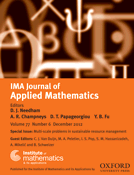
IMA JOURNAL OF APPLIED MATHEMATICS
Transforming Challenges into Solutions Through MathematicsThe IMA Journal of Applied Mathematics, published by Oxford University Press, serves as a pivotal platform for disseminating innovative research in the field of applied mathematics. With its ISSN 0272-4960 and E-ISSN 1464-3634, the journal has established itself as an essential resource for academics and practitioners, showing notable engagement with both theoretical and practical aspects of mathematics. Spanning over five decades since its inception in 1965, the journal covers a broad range of topics aimed at addressing complex real-world problems through mathematical modeling and computational techniques. Holding a Q3 quartile ranking in the applied mathematics category for 2023, and a Scopus rank of #310 out of 635, it plays a significant role in contributing to the academic discourse within this dynamic field. Despite not being open access, the journal's robust reputation and commitment to rigorous peer review ensure that cutting-edge research remains accessible to its audience of researchers, professionals, and students dedicated to advancing mathematical sciences. Its ongoing commitment to exceptional scholarship makes the IMA Journal of Applied Mathematics a vital resource for those seeking to explore and apply mathematical principles in various contexts.
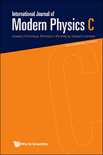
INTERNATIONAL JOURNAL OF MODERN PHYSICS C
Advancing the Frontiers of Computational and Mathematical PhysicsINTERNATIONAL JOURNAL OF MODERN PHYSICS C, published by WORLD SCIENTIFIC PUBL CO PTE LTD, is a pivotal platform for disseminating groundbreaking research in the fields of computational theory, mathematical physics, and statistical physics. With an ISSN of 0129-1831 and an E-ISSN of 1793-6586, this esteemed journal, based in Singapore, serves a global audience of researchers and professionals who are dedicated to pushing the boundaries of knowledge in modern physics. The journal's rigorous selection process ensures the inclusion of high-quality articles that advance the understanding and application of complex theoretical concepts. Currently, the journal holds a commendable Q3 quartile ranking across several categories, including Computational Theory and Mathematics and Statistical and Nonlinear Physics, reflecting its influence and relevance in the academic community. Covering a wide array of topics from 1996 to 2024, the INTERNATIONAL JOURNAL OF MODERN PHYSICS C is not just a repository of research; it is a critical resource for students and scholars aiming to stay at the forefront of modern scientific inquiry.

EPJ Data Science
Exploring New Horizons in Modeling and SimulationEPJ Data Science is a prominent open-access journal affiliated with SPRINGER, dedicated to disseminating high-quality research in the fields of Computational Mathematics, Computer Science Applications, and Modeling and Simulation. Established in 2012, this journal provides a scholarly platform for innovative ideas and methodologies aimed at advancing data science, bridging gaps between theoretical foundations and practical applications. With impressive rankings, including Q1 in Modeling and Simulation and Q2 in both Computational Mathematics and Computer Science Applications as of 2023, EPJ Data Science is recognized for its significant contributions to academia, evidenced by its strong performance in Scopus rankings. The journal is committed to open access, ensuring that research is accessible to a global audience, thereby enhancing collaboration and interdisciplinary communication. Located at One New York Plaza, Suite 4600, New York, NY 10004, United States, it serves as a hub for researchers, professionals, and students eager to share and explore pioneering developments in data science.

Computational and Mathematical Methods
Exploring New Frontiers in Mathematical Modeling and ComputationComputational and Mathematical Methods is a dynamic peer-reviewed journal published by Wiley-Hindawi, focusing on innovative research in the fields of computational mathematics, mechanics, and theory. Since its transition to an Open Access format in 2022, the journal has enhanced its accessibility to researchers and practitioners globally, providing a platform for the dissemination of high-quality studies that contribute to emerging developments in mathematical modeling and computational techniques. Based in the United Kingdom, this journal is committed to fostering collaboration amongst scholars, evidenced by its rankings within Scopus: Q3 in computational mathematics, computational mechanics, and computational theory and mathematics, reflecting its relevance and influence within these critical fields. With an emphasis on interdisciplinary studies, Computational and Mathematical Methods is an essential resource for researchers, professionals, and students seeking to expand their knowledge and apply cutting-edge methodologies to practical challenges.
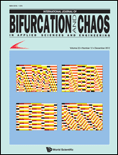
INTERNATIONAL JOURNAL OF BIFURCATION AND CHAOS
Illuminating the Path of Chaotic Systems ResearchINTERNATIONAL JOURNAL OF BIFURCATION AND CHAOS is a premier scholarly publication renowned for its focus on the intricate dynamics of bifurcation and chaotic systems across various scientific disciplines. Established in 1996 and published by World Scientific Publishing Co Pte Ltd, this journal plays a significant role in fostering interdisciplinary research within the realms of applied mathematics, engineering, and modeling & simulation, boasting impressive quartile rankings of Q1 in Multidisciplinary studies and Q2 across other key categories as of 2023. With an active convergence of cutting-edge research and comprehensive reviews, this journal engages with the academic community by providing a platform for novel findings and theoretical advancements. Researchers, professionals, and students alike will benefit from its rich content, reflecting the ever-evolving landscape of complexity science. Access to the journal is subscription-based, ensuring a curated selection of high-impact articles that adhere to the highest standards of academic excellence.
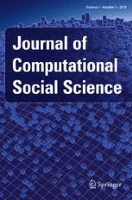
Journal of Computational Social Science
Exploring the Nexus of Technology and SocietyThe Journal of Computational Social Science, published by SpringerNature, is a premier platform for interdisciplinary research at the intersection of social sciences and computational techniques. Since its inception in 2018, this open-access journal has garnered attention for its robust contributions to the fields of Artificial Intelligence and Transportation, holding a distinguished Q2 ranking in both categories as of 2023. Situated in Singapore, the journal embraces a wide scope aimed at exploring innovative applications of computational methods to address complex social phenomena, making it an essential resource for researchers, professionals, and students alike. With a growing impact and recognition—reflected by its Scopus rankings, notably at the 47th percentile in Transportation and 63rd in Artificial Intelligence—the Journal of Computational Social Science is dedicated to facilitating knowledge exchange and fostering collaboration in an era where technology increasingly informs social dynamics. Access to cutting-edge research in this field is vital for enriching scholarly discourse and advancing practical solutions to contemporary challenges.

Journal of Organization Design
Advancing the Future of Organizational TheoryWelcome to the Journal of Organization Design, a pioneering academic platform published by SpringerNature, dedicated to advancing the field of organization theory and management. Since its inception as an open-access journal in 2012, it has provided a vital forum for researchers, practitioners, and students to explore innovative ideas and evidence-based practices in organizational design. With an impressive Q2 ranking in Strategy and Management for 2023, the journal is recognized for its impactful contributions, as indicated by its Scopus rank of #227 out of 478, placing it in the 52nd percentile among its peers. The journal's cross-disciplinary approach encourages the convergence of ideas from diverse fields, fostering collaboration and holistic understanding within the domain. Its base in the United Kingdom allows for a unique blend of global perspectives that enriches the scholarly dialogue. For those seeking to stay abreast of the latest trends and research, the Journal of Organization Design represents a crucial resource, catering to the needs of the academic community and beyond.
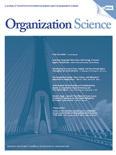
ORGANIZATION SCIENCE
Empowering Scholars in the Science of OrganizationsORGANIZATION SCIENCE is a premier academic journal published by INFORMS, focusing on the interdisciplinary field of organizational studies. With an impressive ranking in the top quartile (Q1) across various categories—including Management of Technology and Innovation, Organizational Behavior and Human Resource Management, and Strategy and Management—this journal has established itself as a critical platform for disseminating pioneering research. The journal's commitment to advancing understanding of organizational processes and structures since its inception in 1996 is reflected in its rigorous selection criteria and high-impact contributions to the field. Researchers, professionals, and students engaged in exploring the dynamics of organizations will find valuable insights within its pages, empowered by critical reviews, empirical studies, and theoretical advancements. Although ORGANIZATION SCIENCE is not open access, it provides a vital resource for those seeking to enhance their knowledge and apply innovative strategies to real-world organizational challenges. With its ongoing convergence into the latest trends through 2024, this journal remains a cornerstone of scholarly communication and a must-read for those committed to the study of organizational phenomena.

Mathematical Foundations of Computing
Empowering Research with Open Access to Mathematical TheoriesMathematical Foundations of Computing, published by the American Institute of Mathematical Sciences (AIMS), is a distinguished open-access journal that has been actively disseminating influential research in the fields of Artificial Intelligence, Computational Mathematics, Computational Theory and Mathematics, and Theoretical Computer Science since its inception in 2009. With its E-ISSN 2577-8838, this journal is committed to providing researchers and practitioners with cutting-edge mathematical theories and methodologies that underpin modern computational practices, which is critical for advancing the field. The journal proudly holds a Q3 categorization in several relevant domains as of 2023, reflecting its contribution and accessibility amid an evolving academic landscape. By offering open access to its content, it ensures that vital research is freely available to a global audience, enhancing collaboration and innovation. Positioned in the heart of the United States, Mathematical Foundations of Computing serves as a crucial resource for advancing knowledge and fostering discussions among researchers, professionals, and students passionate about the mathematical underpinnings of computing.

Applied and Computational Mathematics
Transforming Ideas into Solutions: The Heart of Applied MathematicsApplied and Computational Mathematics is a premier journal dedicated to the dissemination of innovative research in the fields of applied mathematics and computational mathematics. Published by the MINISTRY COMMUNICATIONS & HIGH TECHNOLOGIES REPUBLIC AZERBAIJAN, this journal offers a prominent platform for scholars and practitioners worldwide, boasting an impressive Q1 category ranking in applied mathematics and Q2 in computational mathematics for 2023. With an excellent Scopus ranking placing it in the 96th percentile for both categories, it highlights the high quality and global impact of its published work. The journal spans a wide range of topics, ensuring it remains relevant to current and emerging trends in both theoretical and applied contexts. Access to its articles is streamlined through open channels, promoting collaboration and knowledge sharing among researchers. Applied and Computational Mathematics is pivotal for advancing the discipline and supporting the academic community's growth, making it an essential resource for researchers, professionals, and students alike.